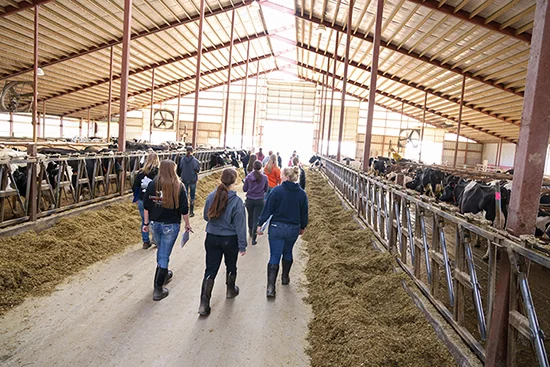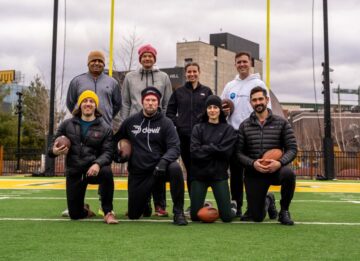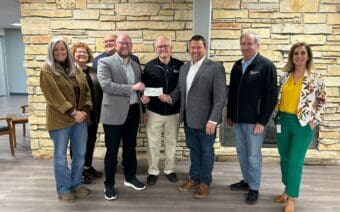
September 6, 2023
APPLETON – From manure processing systems and methane digesters to invisible pasture fencing and robotic milkers, Sarah Mills-Lloyd, horticulture, farm operations and farm business production management department chair at Fox Valley Technical College (FVTC), said advancing technologies are having significant impacts on the agriculture industry.
“Automation in the agriculture industry is becoming more common,” she said.
In an effort to continue supporting a career in this growing industry for students throughout Northeast Wisconsin, Mills-Lloyd said FVTC has launched a new technical diploma in dairy automation.
“FVTC is the first in the Wisconsin Technical College System to offer a degree in dairy automation,” she said. “It’s a unique position for us.”
Mills-Lloyd said the dairy automation degree program combines technology and automated systems in dairy farming to enhance efficiency, productivity and animal welfare while promoting sustainability and competitiveness in the dairy industry.
She said the program seeks to equip individuals in this evolving field through the understanding of essential technical skills in both dairy and automation.
“It offers classes related to different departments – agriculture and automation – both housed under one division,” she said.
Mills-Lloyd said the technical degree encompasses about 30 credits and is financial-aid eligible.
“Depending on your involvement, and if this is something extra you’re doing on top of a full-time career, you can come in and come out of it. But typically, if you’re a full-time student, it should take about a year to complete.”
Through the course, Mills-Lloyd said students will gain cross-functional, hands-on expertise in agriculture and automation through courses in agriculture, electronics, computers, control systems, programming, robots, fluid power, sensors and more.
On the dairy side of things, Mills-Lloyd said classes include Dairy/Livestock Management, Dairy/Livestock Records and Spanish Language and Culture for Dairy, which was designed specifically for this diploma.
“(The new class provides) the opportunity for students to expand their cultural competency and awareness, as well as the ability to communicate in Spanish in the dairy industry,” she said.
Students, Mills-Lloyd said, will be introduced to the basics of the Spanish language for dairy operations – including pronunciation, conversation and common dairy terminology related to daily tasks and protocols – as well as develop the language skills and cultural understanding to communicate confidently with Spanish speakers on the farm.
“Students will be able to reflect, and hopefully compare and contrast, language with a variety of populations – providing them a cultural awareness to be able to communicate as we have a cultural overlap in the dairy industry.”
Classes on the automation side of the degree, Mills-Lloyd said include a variety of classes, such as PLC 1 (programmable logic controllers), DC (direct current) Circuits 1, 2 & 3, AC (alternating current) Circuits 1 and Ladder Logic and Control Devices.
“It is an integration of existing classes,” she said.
A multi-stepped process
Mills-Lloyd said the new technical degree came about through feedback from the department’s advisory committee.
“One exists for each program area, and these committees meet once a semester to provide feedback on courses and for us to hear updates on industry trends,” she said.

Sarah Mills-Lloyd said the dairy automation technical degree gives individuals who want to work in the agriculture sector, but not directly with animals, an opportunity to do so. Photo Courtesy of Fox Valley Technical College
Between the committee’s feedback and feedback the department was receiving from key stakeholders, partners and farmers, Mills-Lloyd said the decision was made to pursue adding the technical degree.
“A further exploration of the program was sought to determine whether or not the need indeed existed,” she said.
Mills-Lloyd said the process starts with a survey of potential employers.
“Because at the end of it, we want to make sure our graduates will have jobs,” she said. “We do a survey of potential employers for this degree for students to know they will have a job after graduation – showing what that would look like even for the rate of salary or hourly wage.”
From there, Mills-Lloyd said the proposed degree goes through a multi-step approval process: first with the FVTC executive team; then an initial concept approval by the FVTC board of trustees; up next it goes to the agriculture and natural resources department of the Wisconsin Technical College System; back for secondary approval by the FTVC board of trustees; and then a final approval by the Wisconsin Technical College System.
“It usually takes 12-18 months from concept to implementation,” she said. “It’s a long process, but it’s a needed process to make sure we are doing what we need to do to meet the employment needs of the graduates coming out of that degree.”
Leveraging opportunities
As far as career paths, Mills-Lloyd said dairy automation offers paths in both traditional and emerging positions.
“This is an evolving technological landscape,” she said. “Opportunities can range from managing existing systems to designing systems, to maintaining systems and also troubleshooting – all related to dairy-farming-related agriculture technology. Specifically, we look at manure handling and milking and feeding automated systems.”
Mills-Lloyd said specific titles and responsibilities may vary depending on the company, location and the level of automation involved in the dairy operations, but some include:
Service/installation dairy technicianTechnical support specialistRobotic milking technical support specialistSenior maintenance technicianField service technicianDairy process specialistOperations technician
Through the survey step of the process, Mills-Lloyd said entry-level employee wages for graduates of the dairy automation technical degree would range from $16 to $29 per hour.
“This is a two-year-old survey, so take into account change, but the average is about $22 an hour,” she said. “Obviously, the range of salaries for dairy automation jobs can vary depending on factors such as job position, experience, location and the size of the dairy operation.”
Exploring efficiencies on a farm, Mills-Lloyd said, isn’t new to the industry, but one being highlighted as of late due to labor shortages.
“So, (the dairy automation technical degree provides) another career opportunity to come alongside and complement what we’re seeing as an industry trend – a lot of labor shortage issues we’re trying to mitigate,” she said.
Mills-Lloyd said it also gives individuals who want to work in the agriculture sector – but maybe not directly with animals – an opportunity to do so.

Sarah Mills-Lloyd
“There are a lot of companies within Northeast Wisconsin that are dependent on skilled workers for that design, implementation, maintenance and troubleshooting systems – typically those utilized in milking, feeding and manure handling,” she said.
As a technical degree, Mills-Lloyd said many of the classes students will take can be intermingled with other existing degree programs in the agriculture and automation departments.
“It dovetails with existing classes already offered within the agriculture automation departments,” she said. “So, it is uniquely positioned to allow students an opportunity to seek a degree in automation, with potentially putting alongside another associate’s degree, which offers the highest credentialing the college offers.”
Mills-Lloyd said FVTC also looks at student pathways.
“How can we then get students involved at maybe the certificate level and then get them into a technical diploma?” she said. “We look at those different pathways to provide students with the most opportunities possible while they are students at the college.”
Upon completion of the the technical degree program, Mills-Lloyd said students will be able to:
Apply relevant technologiesIntegrate automation and mechanical control systemsInteract as a professional in agribusinessPerform work safelyTroubleshoot electrical and mechanical systems and devices.
For more information on the dairy automation technical degree at FVTC, visit fvtc.edu.
 TitletownTech is nearly on the clock
TitletownTech is nearly on the clock De Pere, Greener Bay Compost team up to fight food waste
De Pere, Greener Bay Compost team up to fight food waste





